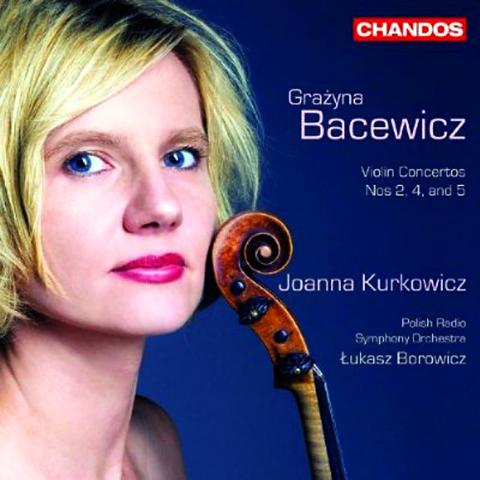Despite the popularity of downloads and DVDs, the CD format continues to see a mass of new releases. In this, it’s rather like live theater — less popular in terms of numbers than its electronic challengers, but catering instead to a variety of small interest groups. In the same way the stage play has become the province of metropolitan intellectuals, so the CD has become the medium for enthusiasts of nonmainstream music.
But when I started listening to the six violin concertos by the female Polish composer Grazyna Bacewicz (1909 to 1969), I was so overwhelmed that I wasn’t at all sure the appellation “nonmainstream” was applicable. A violinist herself, Bacewicz wrote seven concertos for the instrument of which one, No. 6, has been lost or is for some other reason unavailable for performance. Chandos has issued the remaining six on two CDs, the second of which appeared in June. All are first-time recordings.
There’s a huge paradox here. Bacewicz is widely known in her native Poland, and in fact the country issued a stamp in 2009 to commemorate the 100th anniversary of her birth. And yet these violin concertos, uniformly magnificent, are here being recorded only for the first time.

The style is simultaneously sensuous and dynamic, a sort of Slavish version of Erich Korngold, but far more inventive, adventurous and thrilling. Immediately you listen to them you feel that you want to hear them over and over again. I’d go further. Mozart has six violin concertos extant, and if I had to take either his six or Bacewicz’s six onto a desert island, I’d opt for Bacewicz’s without a moment’s hesitation — yet I’m nothing if not a Mozart enthusiast.
They’re played here by Joanna Kurkowicz and the Polish Radio Symphony Orchestra under their charismatic young conductor Lukasz Borowicz. Kurkowicz’s sweeping style, strong on emphasis and exceptionally self-confident, gives these concertos exactly what they need. Indeed, this pair of recordings is likely to catapult Bacewicz into a new and belated international celebrity.
It may be, anyway, that hers is a music whose time has finally come. Chandos is not the only setup to be taking notice of her. Deutsche Grammophon last year came up with a recording of Bacewicz’s two piano quintets, with none other than Krystian Zimerman at the keyboard [DG 4778332]. If Zimerman is taking an interest in this composer, then it’s more than likely that a number of others in the performance community will soon be doing the same.

It isn’t often that you witness a new voice being launched onto the international market, but this appears to be what’s happening. Be that as it may, these two CDs are worth their weight in gold. The performances by Kurkowicz and by the orchestra are sensational, and the recording quality is at the very peak of its class.
“My sincere hope is that generations of violinists, teachers and critics will be attracted to Grazyna Bacewicz’s oeuvre,” writes Kurkowicz, “especially the violin concertos, and that the quality and originality of Bacewicz’s works will secure them the acclaim they so richly deserve, and their rightful place among the masterpieces of the repertoire.”
Another rendition of a relatively modern violin concerto, that by Philip Glass, is far less engaging, however. It’s in a version for soprano saxophone rather than violin, with Amy Dickson the saxophonist and Mikel Toms conducting the Royal Philharmonic Orchestra.

Unfortunately the tones of the soprano sax don’t cut the air with the vibrancy of a violin, so Glass’ work is totally changed, and not for the better. Also on the CD (from Sony Music) is the first movement of John Tavener’s The Protecting Veil, again arranged for soprano saxophone by the soloist, plus a piece specifically written for this combination, Where the Bee Dances, by Michael Nyman.
Edgar Bainton was a successful English composer of the first half of the 20th century. As the surge of 12-tone serialism increasingly challenged musicians to consider it the only embodiment of the modern, his works plummeted out of fashion. But once again Chandos is galloping to the rescue, and offering a sample Bainton CD for our consideration.
Every item here is a premiere recording, a fact in itself significant. Most of the works date from just after World War I (during which Bainton was imprisoned in Germany after he was arrested while attending the Wagner festival at Bayreuth the week war was declared). Some of the shorter pieces are mildly attractive as presented by the BBC Philharmonic under Paul Daniel. They’re mostly reminiscent of Delius, with intimations of Holst here and there. But the longest item, his Concerto Fantasia, a half-hour piece for piano and orchestra, seemed entirely without interest. “Tinkling garbage,” as a friend of mine commented, and sadly I had to agree.

Not all forgotten composers, in other words, are worth reviving.

On April 26, The Lancet published a letter from two doctors at Taichung-based China Medical University Hospital (CMUH) warning that “Taiwan’s Health Care System is on the Brink of Collapse.” The authors said that “Years of policy inaction and mismanagement of resources have led to the National Health Insurance system operating under unsustainable conditions.” The pushback was immediate. Errors in the paper were quickly identified and publicized, to discredit the authors (the hospital apologized). CNA reported that CMUH said the letter described Taiwan in 2021 as having 62 nurses per 10,000 people, when the correct number was 78 nurses per 10,000

As we live longer, our risk of cognitive impairment is increasing. How can we delay the onset of symptoms? Do we have to give up every indulgence or can small changes make a difference? We asked neurologists for tips on how to keep our brains healthy for life. TAKE CARE OF YOUR HEALTH “All of the sensible things that apply to bodily health apply to brain health,” says Suzanne O’Sullivan, a consultant in neurology at the National Hospital for Neurology and Neurosurgery in London, and the author of The Age of Diagnosis. “When you’re 20, you can get away with absolute

May 5 to May 11 What started out as friction between Taiwanese students at Taichung First High School and a Japanese head cook escalated dramatically over the first two weeks of May 1927. It began on April 30 when the cook’s wife knew that lotus starch used in that night’s dinner had rat feces in it, but failed to inform staff until the meal was already prepared. The students believed that her silence was intentional, and filed a complaint. The school’s Japanese administrators sided with the cook’s family, dismissing the students as troublemakers and clamping down on their freedoms — with

As Donald Trump’s executive order in March led to the shuttering of Voice of America (VOA) — the global broadcaster whose roots date back to the fight against Nazi propaganda — he quickly attracted support from figures not used to aligning themselves with any US administration. Trump had ordered the US Agency for Global Media, the federal agency that funds VOA and other groups promoting independent journalism overseas, to be “eliminated to the maximum extent consistent with applicable law.” The decision suddenly halted programming in 49 languages to more than 425 million people. In Moscow, Margarita Simonyan, the hardline editor-in-chief of the